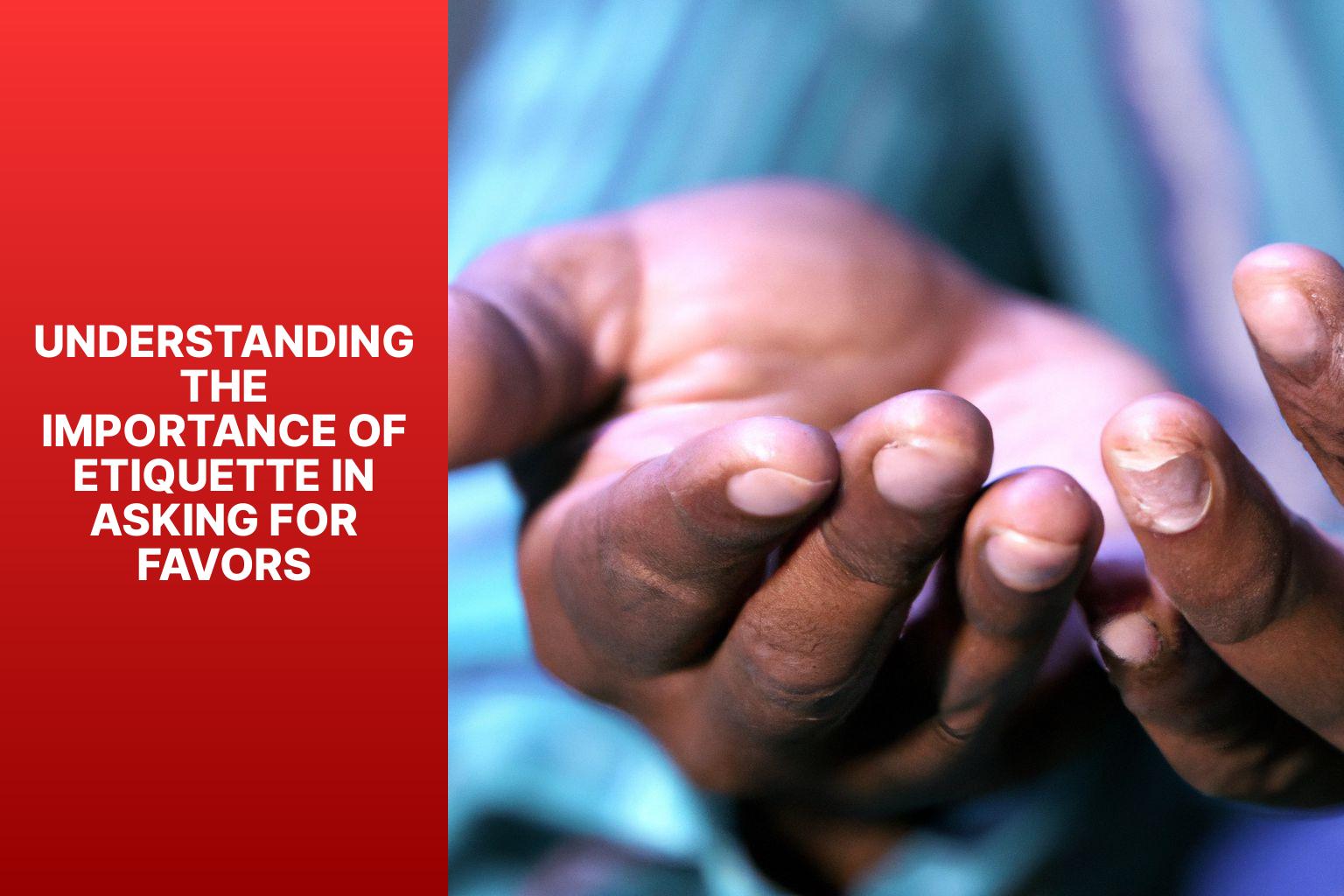The Etiquette of Asking for Favors: How to Approach with Respect
Etiquette plays a vital role in our interactions and relationships with others, even when it comes to asking for favors. Understanding the importance of etiquette in requesting favors is essential for maintaining positive relationships and showing respect for others. Approaching someone with respect when asking for a favor has several benefits. Building and maintaining relationships is one key advantage, as it shows that you value the other person and their time. It also demonstrates gratitude and appreciation, making the other person more likely to be willing to help you. So, how can you approach someone for a favor with respect? Start by choosing the right time and place, ensuring that the person is available and receptive to your request. Frame your request politely, using appropriate language and tone. Be clear and specific about what you need, ensuring that the person understands your request fully. it’s important to consider the other person’s perspective and priorities.
Show empathy and understanding towards their potential commitments and limitations. Avoid common mistakes like being too demanding or entitled, failing to communicate clearly, neglecting the other person’s boundaries, and forgetting the importance of expressing gratitude and following up. If you feel fear or anxiety when asking for favors, remember to prepare and practice your request, focus on the mutual benefits, and reassure yourself that it’s okay to ask for help. By following these guidelines, you can approach asking for favors with respect and maintain healthy relationships with others.

1. Understanding the Importance of Etiquette in Asking for Favors:
- Etiquette is crucial when asking for favors as it sets the tone for respectful interactions.
2. Why Approach with Respect When Asking for Favors?
- Building and Maintaining Relationships:
- Approaching with respect helps build and maintain positive relationships with others.
- Demonstrating Gratitude and Appreciation:
- Showing respect when asking for a favor demonstrates gratitude and appreciation for the other person’s willingness to help.
3. How to Approach Someone for a Favor with Respect:
- Choose the Right Time and Place:
- Selecting an appropriate time and place to ask for a favor shows respect for the other person’s schedule and comfort.
- Frame Your Request Politely:
- Using polite language and tone when making the request conveys respect and consideration for the other person’s feelings.
- Be Clear and Specific in Your Request:
- Being clear and specific about what you need helps the person understand and fulfill your favor effectively.
- Consider the Other Person’s Perspective and Priorities:
- Show empathy by considering the other person’s perspective and priorities when making the request, respecting their needs and limitations.
- Show Empathy and Understanding:
- Showing empathy and understanding for the other person’s potential hesitations or constraints helps create a respectful and considerate approach.
4. Common Mistakes to Avoid When Asking for a Favor:
- Being Too Demanding or Entitled:
- Avoid coming across as demanding or entitled, as it undermines respect and creates tension in the relationship.
- Failing to Communicate Clearly:
- Clear communication is essential to avoid misunderstandings and ensure respectful interactions when asking for favors.
- Not Considering the Other Person’s Boundaries:
- Respect the other person’s boundaries and limitations, understanding that they may not always be able to fulfill the favor.
- Ignoring the Importance of Gratitude and Follow-up:
- Expressing gratitude and following up with appreciation after receiving a favor are crucial to maintaining respect and strengthening the relationship.
5. Tips for Overcoming Fear or Anxiety When Asking for Favors:
- Prepare and Practice Your Request:
- Preparing and practicing your favor request can help alleviate fear or anxiety, enabling you to approach the situation with confidence and respect.
- Focus on the Mutual Benefits:
- Emphasizing the mutual benefits of the favor can help alleviate anxiety and create a more positive and respectful interaction.
- Remember That It’s Okay to Ask for Help:
- Recognize that asking for help is a normal part of life, and by doing so with respect, you can foster stronger relationships and support systems.
Understanding the Importance of Etiquette in Asking for Favors

Photo Credits: Www.Moderngentlemanmagazine.Com by Juan Williams
Understanding the importance of etiquette in asking for favors is crucial. It helps maintain positive relationships and avoids misunderstandings and conflicts. Respect and a clear understanding of the dynamics involved are essential.
1. Respect the other person’s time: When asking for a favor, be mindful of their schedule and commitments. Avoid making demands or expecting immediate responses. Ask politely and give them enough time to consider and respond.
2. Use polite and clear language: Communication is key. Use polite language and clearly state what you are asking for. Avoid vague or ambiguous statements that may confuse the other person.
3. Express gratitude: Show appreciation for their time and willingness to help. Thank them in advance for considering your request and express gratitude, regardless of whether they can fulfill the favor or not.
4. Understand their boundaries: Respect their personal boundaries and limitations. If they decline the request, accept their decision graciously and without resentment. Do not pressure or guilt-trip them into changing their mind.
5. Reciprocate when possible: If someone does a favor for you, consider ways to reciprocate their kindness. It can be a small gesture, offering help with something they need assistance with, or simply expressing gratitude in return.
By understanding and practicing proper etiquette when asking for favors, you can cultivate positive relationships based on mutual respect and consideration. Remember, maintaining these relationships is important not only for the favor you are seeking but also for future interactions and collaborations.
Why Approach with Respect When Asking for Favors?

When it comes to asking for favors, the way we approach others can greatly impact the outcome. So, why is it important to approach with respect? In this section, we’ll explore the key reasons why showing respect is crucial when seeking favors. We’ll dive into the art of building and maintaining relationships, as well as the significance of demonstrating gratitude and appreciation. Get ready to discover how a respectful approach can go a long way in your favor-seeking endeavors!
Building and Maintaining Relationships
Building and maintaining relationships is crucial when asking for favors, and it is important to incorporate these key points:
1. Establish trust: By being reliable and fulfilling commitments, you can build strong relationships.
2. Communicate effectively: Clear and open communication is crucial in maintaining relationships. When asking for a favor, express your needs clearly.
3. Show appreciation: Regardless of the magnitude of the favor received, express gratitude.
4. Offer reciprocity: Cultivate mutually beneficial relationships by being ready to return favors or offer assistance.
5. Be considerate: Before requesting a favor, respect the other person’s priorities and circumstances. It is essential to respect their boundaries.
6. Stay connected: Regularly keep in touch, engage in conversations, and demonstrate genuine interest in the well-being of the other person.
7. Show empathy: Understand the challenges others may face, and offer support and understanding.
8. Resolve conflicts effectively: Learn to address conflicts constructively, actively listen, and find mutually agreeable solutions.
9. Continuously invest: Nurture meaningful connections by showing genuine care and interest in the other person’s life.
By focusing on these aspects, you can build and maintain strong relationships while approaching others for favors with respect.
Demonstrating Gratitude and Appreciation
Demonstrating gratitude and appreciation is vital when requesting favors. It illustrates respect, strengthens relationships, and fosters future assistance. Here are several ways to naturally demonstrate gratitude and appreciation:
- Verbally express appreciation: Take the time to sincerely thank someone directly after they have done you a favor. Let them know how much their help truly means to you.
- Pen a thank-you note: A handwritten note can authentically convey your gratitude. Take the opportunity to craft a thoughtful thank-you note expressing your heartfelt appreciation for the favor.
- Offer assistance in return: Demonstrate gratitude by offering your help to the person who assisted you. Inform them that you are available whenever they require support.
- Send a small token of appreciation: A modest gift can be a meaningful way to express gratitude. It doesn’t have to be costly, just thoughtful.
- Follow up: After receiving a favor, it is essential to inform the person about the impact of their assistance. Share the positive outcomes and express gratitude once again.
Remember, demonstrating gratitude and appreciation is not solely about reciprocating favors, but genuinely recognizing and valuing the assistance others provide. By showcasing your gratitude, you nurture positive relationships and foster continued support.
How to Approach Someone for a Favor with Respect
Approaching someone for a favor can be a delicate dance, but with the right approach, you can ensure a positive outcome. In this section, we’ll explore key strategies to approach someone for a favor with respect. Learn how to choose the right time and place, frame your request politely, be clear and specific, consider the other person’s perspective and priorities, and show empathy and understanding. Mastering these techniques will help you navigate the etiquette of asking for favors with grace and tact.
Choose the Right Time and Place
When asking for a favor, it is important to choose the right time and place. This ensures that the person you are asking is in a receptive state and increases the likelihood of a positive outcome.
Firstly, it is crucial to pick a suitable location for your conversation. Select a comfortable setting that is free from noise and crowds, making it easier for both parties to communicate effectively.
Secondly, consider the schedule of the person you are seeking a favor from. Take into account their availability and workload. Choose a time when they are free and not overwhelmed with tasks, as this will allow them to give proper attention to your request.
It is also essential to find a time that is free from interruptions. Look for a period when both parties can have a focused conversation without distractions. This will enable better understanding and decision-making.
Being mindful of the other person’s mood is vital. Pay attention to their emotional state. If they appear stressed or preoccupied, it would be better to wait for a more suitable time to approach them. By doing so, you can ensure that they are more open and receptive to your favor.
Respecting the other person’s boundaries is equally important. Make sure you respect their personal space and boundaries. If they seem uncomfortable or unwilling to engage in conversation, be understanding and give them their space.
By consciously choosing the right time and place, you demonstrate respect for their time and priorities. This, in turn, increases the chances of receiving a positive response to your favor.
Frame Your Request Politely
When asking for a favor, it is important to frame your request politely. This ensures a positive response and maintains a respectful relationship. Here are some guidelines:
1. Express appreciation: Start by thanking the person for their time and consideration. Show gratitude for their willingness to listen to your request.
2. Use polite language: Choose respectful and courteous words. Avoid being demanding and instead use phrases like “Would you mind…” or “Would it be possible for…”.
3. Be clear and concise: Clearly state what you need and explain why you are asking for help. Provide all necessary details to ensure a full understanding of the request.
4. Offer alternatives and flexibility: If possible, suggest alternative solutions or options that can work for both parties. This shows your willingness to accommodate their needs and preferences.
5. Show empathy and understanding: Recognize the person’s time constraints and commitments. Express empathy for their situation and reassure them that you understand if they are unable to fulfill the favor.
By framing your request politely, you create a positive and respectful tone that increases the likelihood of a favorable response. Remember to maintain a sincere and appreciative attitude throughout the process.
Be Clear and Specific in Your Request
When asking for a favor, it is important to be clear and specific to ensure that the other person understands what you need. Using precise language helps avoid confusion or misunderstandings. Follow these guidelines when making your request:
1. Clearly state your need: Instead of asking, “Can you help me with something?”, be specific about the favor you are asking for. For example, you can say, “Could you please proofread my presentation slides for spelling and grammar errors?”
2. Provide necessary details: Include relevant information that can help the person fulfill your request. This can include deadlines, specific requirements, or any other important details. For instance, you can add, “I need the proofreading done by tomorrow morning before the meeting.”
3. Avoid vague or ambiguous language: Be precise and avoid using words or phrases that can be interpreted differently. Use specific terms that leave no room for confusion. Instead of saying, “I want some help with my project,” you can say, “I need assistance in creating a project timeline and setting milestones.”
4. Use quantifiable descriptors: If possible, provide specific quantities or measurements to make your request more precise. For example, instead of saying, “Can you give me feedback on my report?”, you can say, “Could you please review my report and provide at least three actionable suggestions for improvement?”
5. Be concise: Keep your request clear and to the point. Avoid unnecessary details or lengthy explanations that can confuse the person. Stick to the essential information that the other person needs to fulfill your favor.
Being clear and specific in your request increases the chances of receiving the assistance you need while minimizing misunderstandings.
Consider the Other Person’s Perspective and Priorities
Considering the other person’s perspective and priorities is crucial when asking for a favor. Understand their point of view to approach them respectfully. Keep these key points in mind:
1. Recognize their time constraints: Take into account the other person’s busy schedule and commitments. Avoid approaching them with a favor when they are overwhelmed or have pressing deadlines. Choose a time when they are likely to be more available and willing to listen.
2. Understand their priorities: Each person has different goals and responsibilities. Consider whether your favor aligns with their current priorities. If it does not, wait for a more opportune moment or find an alternative solution.
3. Show empathy: Put yourself in their shoes and consider how your favor might impact them. Think about any potential challenges they may face. Demonstrating empathy strengthens your relationship and increases the likelihood of a positive response.
4. Offer something in return: Reciprocity is important in any favor request. If possible, provide value or assistance in return. This could be offering your expertise, sharing resources, or helping them with a future task. Showing that you are willing to contribute makes your request more appealing.
5. Be flexible and open to compromise: Respect the other person’s limitations. Be open to adjusting your request or finding middle ground that satisfies both parties. Being flexible and understanding fosters a collaborative and respectful relationship.
Considering the other person’s perspective and priorities is essential when asking for a favor. By doing so, you show respect and increase the chances of a positive outcome.
Show Empathy and Understanding
Showing empathy and understanding is crucial when requesting a favor. It helps establish a connection and ensures a positive interaction. Here are some important points to consider:
1. Listen attentively: Show genuine interest in the other person’s perspective and concerns. Take the time to understand their thoughts and feelings about the favor.
2. Put yourself in their shoes: Try to see the situation from their point of view. Consider their priorities, commitments, and any challenges they may face. Understanding their circumstances allows you to approach the request considerately.
3. Express empathy: Acknowledge their hesitation or difficulties in fulfilling the favor. Let them know you understand and appreciate their efforts. This demonstrates your empathy and the value you place on their assistance.
4. Be patient and flexible: Recognize that the other person may need time to think or negotiate. Be open to adapting or compromising to find a solution that works for both parties.
5. Show gratitude: Regardless of the outcome, express your gratitude for their time and consideration. Let them know you value their willingness to listen and help.
By demonstrating empathy and understanding, you create a positive atmosphere for requesting favors and foster stronger relationships based on mutual respect and support. Effective communication and genuine empathy can make the favor-seeking process more pleasant for everyone involved.
Common Mistakes to Avoid When Asking for a Favor

When it comes to asking for favors, avoiding common mistakes is key. We all want to approach with respect and increase the chances of a positive outcome. In this section, we’ll uncover the pitfalls to steer clear of when asking for a favor. From being too demanding or entitled to failing to communicate clearly, we’ll explore the crucial aspects to keep in mind in order to navigate these situations smoothly. Remember, it’s all about respecting boundaries and showing gratitude.
Being Too Demanding or Entitled
When requesting a favor, it is important to refrain from being too demanding or entitled. This behavior can put a strain on relationships and impede future assistance. Instead, approach the situation with respect and gratitude.
One mistake to avoid is being too demanding or entitled when making your request. Instead, ask politely and respectfully. Utilize phrases such as “Would you be able to…” or “Could you please…” to demonstrate understanding and respect for the other person’s autonomy.
Another error to avoid is failing to communicate clearly. Clearly articulate what you need and why you are seeking help. Be specific so that the other person fully comprehends the task at hand.
Take into consideration the other person’s boundaries. Respect their time, energy, and personal priorities. Understand that they may not always be available or capable of helping. Be flexible and understanding if they are unable to assist in that moment.
Express gratitude and follow up after receiving help. Sincerely express your appreciation. A simple thank you, whether in person or through a message, can foster positive relationships and convey the value you place on their effort.
By avoiding the trap of being too demanding or entitled, approach others with respect and increase the likelihood of receiving help while maintaining healthy relationships.
Failing to Communicate Clearly
When you ask for a favor, clear communication is crucial to avoid misunderstandings. Be explicit and concise in your request to ensure that the other person fully understands what you need.
One common mistake is being too vague or ambiguous. Instead of using phrases like “figure it out” or “do something about it,” clearly state what you specifically need. For example, instead of saying “Can you help me with this project?” be specific and say “I need your assistance in reviewing and providing feedback on this project proposal by Friday.”
Another mistake to avoid is assuming that the other person knows everything. Clearly articulate your expectations, deadlines, and any relevant details. This prevents confusion and ensures that both parties are on the same page.
Actively listen and respond to the other person’s questions or concerns. Failing to communicate clearly means disregarding their need for clarification or additional information. Take the time to address any uncertainties and provide the necessary context to avoid misunderstandings.
Follow up to ensure that your message was understood and that any actions or decisions are clear. This shows your commitment to effective communication and helps avoid any potential misunderstandings or missed opportunities. By being clear and concise in your communication, you increase the likelihood of a successful outcome.
Not Considering the Other Person’s Boundaries
When asking for a favor, respect the other person’s boundaries to maintain a healthy relationship. Here are key considerations:
1. Mind their time: Recognize their commitments and avoid approaching them during busy times. Be understanding if immediate assistance is not possible.
2. Respect their feelings: Understand their limits and comfort zones. If they express reluctance, don’t pressure them. Acknowledge their boundaries.
3. Consider their priorities: Your favor may not be their top priority. Respect their responsibilities. This earns appreciation and increases future assistance.
4. Communicate openly: Clearly explain your request and listen attentively. Respect their perspective, and be willing to compromise if necessary.
5. Express gratitude and follow up: Thank them sincerely, regardless of their response. If they offer assistance, follow up to show appreciation.
By considering the other person’s boundaries, you demonstrate respect and cultivate a positive relationship. This fosters understanding and increases the likelihood of receiving future assistance.
Ignoring the Importance of Gratitude and Follow-up
Ignoring the importance of gratitude and follow-up when asking for a favor can harm relationships and reduce the chances of receiving future help.
It is vital to express sincere gratitude to the person who assisted you, whether through a verbal thank you or a written note.
It is crucial to follow up with them to provide an update or explain how their help benefited you.
If possible, it is recommended to return the favor by offering assistance or finding ways to reciprocate their kindness.
Maintaining regular contact with the person will cultivate a strong bond and foster a sense of mutual support.
It is important to remember that acknowledging the kindness and effort of others creates a positive and supportive network.
Tips for Overcoming Fear or Anxiety When Asking for Favors

Overcoming fear or anxiety when asking for favors can be a daunting task, but fear not! This section will equip you with practical tips to navigate those nerve-wracking situations with confidence. From preparing and practicing your request to focusing on the mutual benefits, and most importantly, understanding that it’s perfectly acceptable to ask for help – we’ve got you covered. Get ready to conquer those fears and master the art of asking for favors graciously.
Prepare and Practice Your Request
When asking for favors, it’s important to prepare and practice your request. This will increase the chances of a positive response. Here are the steps to prepare and practice your request:
1. Clarify your needs: Before asking for a favor, clearly define what you need assistance with. This avoids confusion and ensures the other person understands your request.
2. Anticipate questions: Put yourself in their shoes and think about any concerns they may have. Prepare thoughtful responses to address these queries and alleviate doubts.
3. Outline key points: Create a list of points you want to convey. This helps you stay organized and focused during the request.
4. Practice your pitch: Rehearse your request out loud. Speak confidently and clearly, emphasizing the importance and benefits. Pay attention to your tone and body language to convey sincerity and respect.
5. Seek feedback: Ask a trusted friend or family member to listen to your practice pitch. They can provide constructive feedback and ensure your request comes across as respectful and genuine.
By preparing and practicing your request, you show respect for their time and effort. This increases the likelihood of a successful outcome. Remember, it’s okay to ask for help as long as you approach the situation with respect.
Focus on the Mutual Benefits
When you approach someone for a favor, it is important to focus on the mutual benefits. By doing so, you increase the likelihood of a positive outcome and create a sense of cooperation.
- 1. Focusing on the mutual benefits can enhance the relationship and foster teamwork. By collaborating on a project, both parties can contribute their skills and knowledge.
- 2. Sharing resources with others can lead to cost savings, increased productivity, and improved outcomes.
- 3. By focusing on the mutual benefits, you can create reciprocity and build stronger relationships. This can be achieved by demonstrating a willingness to help others.
- 4. Collaborating on a research project can contribute to personal and professional growth.
- 5. By addressing common challenges or issues and finding innovative solutions, you can overcome obstacles and achieve shared goals.
Therefore, it is important to focus on the mutual benefits when approaching someone for a favor. This demonstrates respect for the other person’s interests and needs, increasing the chances of a positive response and a successful outcome.
Remember That It’s Okay to Ask for Help

When it comes to asking for favors, “Remember That It’s Okay to Ask for Help.” Here are some reasons why:
1. Overcoming limitations: Asking for help overcomes challenges and enables access to resources and expertise.
2. Building connections: Asking for help strengthens relationships and fosters teamwork.
3. Expanding knowledge and skills: Seeking assistance aids in learning and acquiring new knowledge and skills.
4. Achieving goals faster: Asking for help accelerates progress by leveraging others’ knowledge and experience.
5. Creating reciprocity: Asking for help encourages future reciprocation.
6. Supporting others: Asking for help allows others to contribute and feel valued.
“Remember That It’s Okay to Ask for Help.” Asking for help is not a sign of weakness, but a recognition of limitations and a willingness to collaborate. Don’t hesitate to reach out when needed.
Frequently Asked Questions
How can I capture the attention of my audience when making a favor request?
When making a favor request, it is crucial to capture the attention of your audience. You can do this by setting the stage and providing a concise and compelling reason for your request, highlighting why it is important. Make sure to avoid indulging in small talk or excessive compliments beforehand and get straight to the point. Being clear and simply worded in your request will help capture their attention effectively.
What are some behaviors to avoid when asking for a favor?
When asking for a favor, it is important to avoid certain behaviors that could offend or inconvenience the person you are asking. Some behaviors to avoid include not being clear and specific about what you need, not respecting the person’s decision if they refuse, and not respecting their boundaries. It is also important to avoid coming across as entitled or aggressive, as this can hinder your chances of getting the favor you are asking for.
How do I politely deal with difficult situations when asking for a favor?
Dealing with difficult people or situations when asking for a favor can be challenging, but it is important to handle them politely. One strategy is to provide an escape clause, giving the person an opportunity to gracefully decline without feeling uncomfortable. Maintaining a respectful and calm demeanor throughout the conversation can help defuse any tension or difficulties that may arise.
How can I set the stage effectively when asking for a favor?
Setting the stage appropriately is crucial when asking for a favor. Start by choosing the right person to ask, someone who has the capacity to grant the favor you are seeking. Approach them at an appropriate time and in a private location to avoid any potential embarrassment or discomfort. This will help create a conducive environment for making your favor request.
What are some tips for increasing the chances of receiving help from others when asking for a favor?
When asking for a favor, there are several tips you can follow to increase the likelihood of receiving help from others. Be crystal clear and specific about what you need and any relevant deadlines or qualifying information. Explain the reasons behind your request, building trust and honesty with the person you are asking. Be prepared to reciprocate the favor or show gratitude and appreciation if the favor is granted, as this will encourage others to help you in the future.
How can I overcome the fear of asking for a favor and not feel embarrassed?
Overcoming the fear of asking for a favor and not feeling embarrassed can be challenging, but it is important to remember that asking for help is a natural part of human interaction. To overcome this fear, remind yourself that asking for a favor is not a bad thing, and that most people are willing to help if approached with respect. It can also be helpful to have a backup plan in case the first person you ask is unable to assist. Be prepared to offer your own assistance to others when they need it, which can help foster a sense of reciprocity and create a more supportive network.
